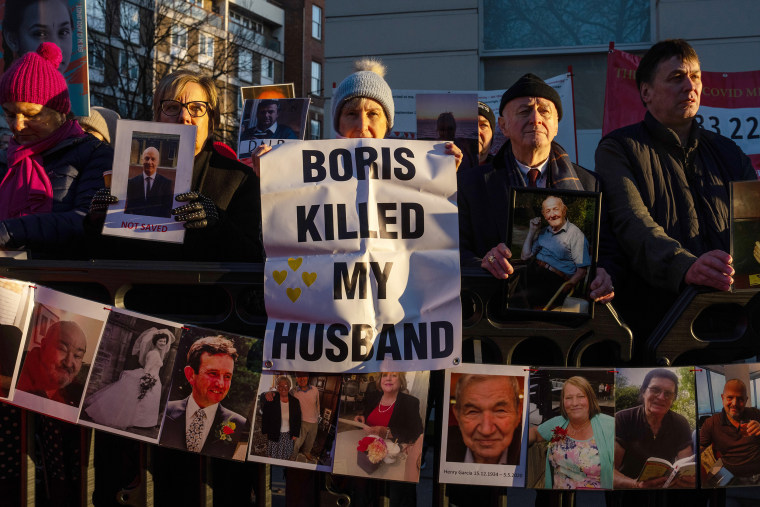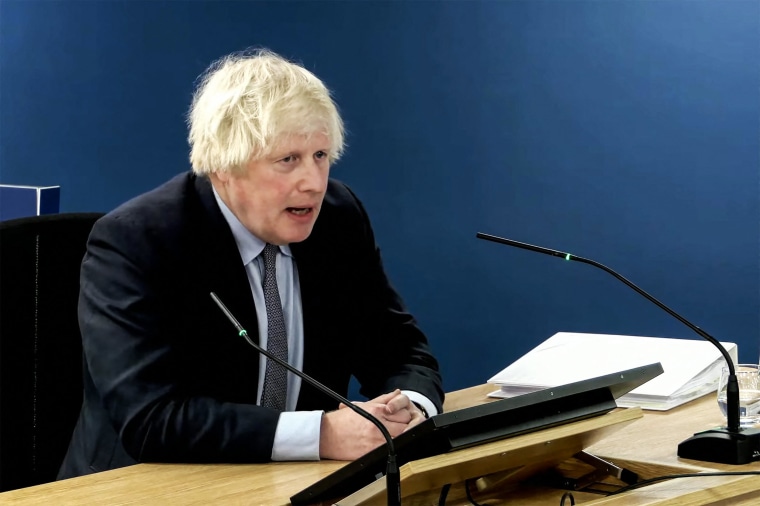Former British Prime Minister Boris Johnson said Wednesday he was deeply sorry for the loss of life during the Covid pandemic and accepted he had made mistakes, but struggled to say specifically what he could have done differently.
Johnson said he took personal responsibility for all decisions that were made and he understood the public’s anger after the inquiry heard testimony of government incompetence, backstabbing and misogyny as it battled the biggest health crisis in decades.
The hearing was disrupted by protesters, who were warned, and in some cases ordered to leave, by the inquiry’s chairwoman.
“Can I say that I understand the feelings of the victims and their families, and I am deeply sorry for the pain and the loss and the suffering of those victims and their families,” Johnson said.
“Were there things we could have done differently? Unquestionably. But I would struggle to itemize them before you now in a hierarchy.”
Johnson, prime minister for three years between 2019 and 2022, resigned in disgrace after a series of scandals including reports that he, and other officials, had been present at alcohol-fueled gatherings in Downing Street during 2020 and 2021 when most people in Britain were forced to stay at home.
The inquiry has already heard damaging testimony about Johnson’s handling of the crisis, including his reluctance to lock down, and how he was confused by the science.

Johnson was said to have asked at one point if blowing a hair-dryer up his nose could kill the virus and suggested he should be injected with Covid on TV to calm public fears.
Johnson faces two days of questioning in what are likely to be the most emotionally charged sessions of the official investigation so far into why Britain ended up with one of the world’s highest death tolls during the pandemic.
Covid-19 killed more than 230,000 people in Britain and infected many millions more.
'Let people die'
Johnson arrived at the inquiry in the dark, more than three hours before the hearing began, avoiding the families of some of those who died from Covid-19, and who had wanted to confront Johnson over claims that he told colleagues he would prefer to see people die in large numbers than order a second lockdown.
Aamer Anwar, the solicitor representing Scottish bereaved Covid families, said Johnson oversaw “a deadly culture of impunity, incompetence” and treating people like “toxic waste.”
Although Johnson has given evidence to parliament before about how he managed the pandemic, he is expected to provide the most detailed public account about his decision making in 12 hours of questioning over two days.
The inquiry has seen evidence from the government’s former chief scientific adviser, Patrick Vallance, who wrote in his diary in Oct. 2020 that Johnson wanted to let the virus spread rather than order another lockdown.
Other senior advisers including Dominic Cummings and Eddie Lister claim Johnson also said “let the bodies pile high”.
Johnson has denied making those comments.
Testimonies in recent weeks have described how Johnson struggled to make decisions at key moments in the crisis, including when to impose curbs on the public’s movements.
In private messages seen by the inquiry, Simon Case, Britain’s most senior civil servant, claimed that his boss changed strategic direction every day and was unable to lead.
